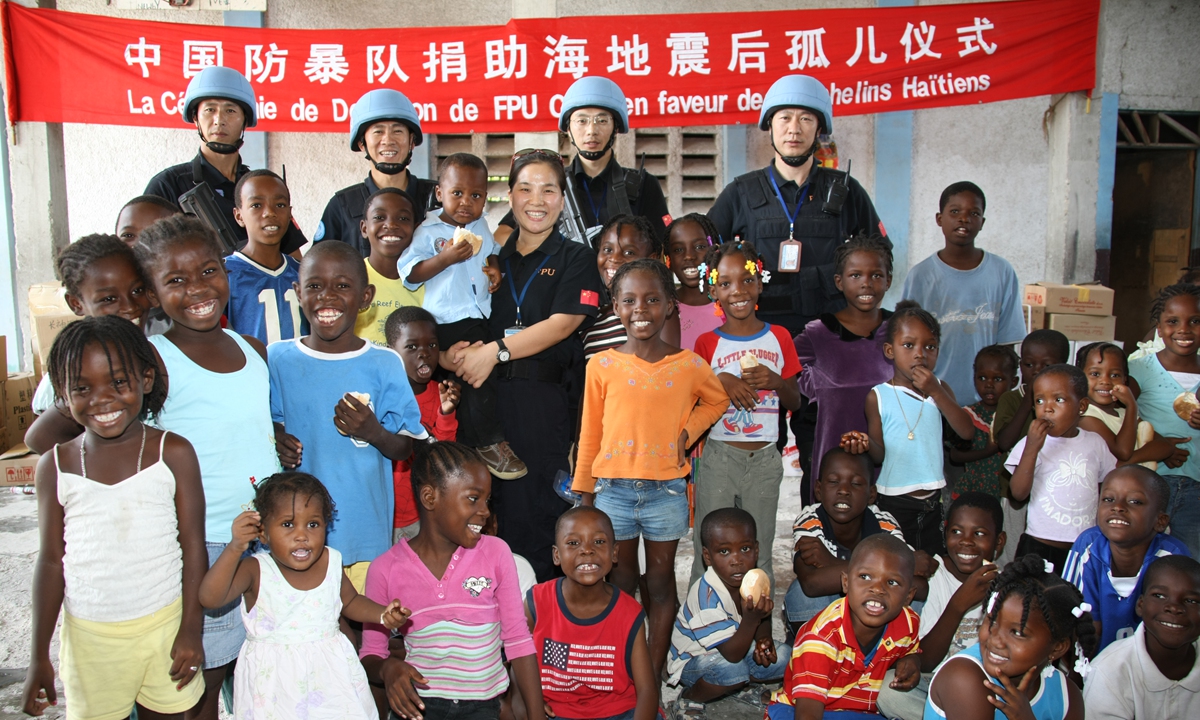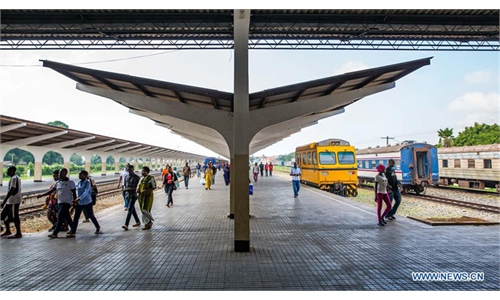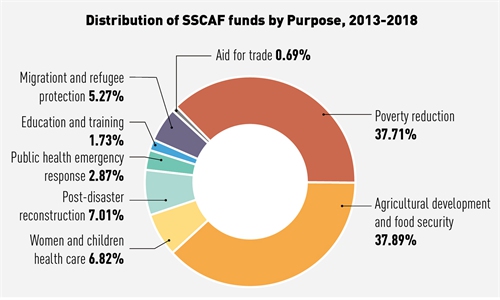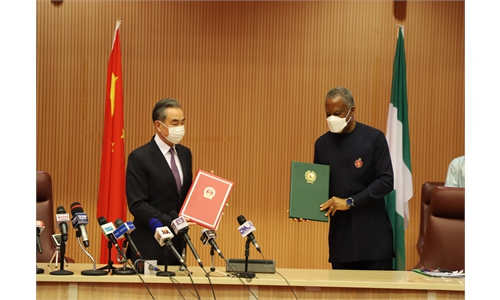Cooperation in public health to spearhead China's international efforts, rekindling US interest welcomed
Aid features endogenous growth of developing countries, green development

Officers of the Chinese peacekeeping anti-riot police team take a picture with Haiti earthquake orphans at a donation ceremony. File photo: courtesy of Department of International Cooperation of Ministry of Public Security
Cooperation in public health will spearhead China's international cooperation in the coming years, Chinese analysts said, as a key white paper put helping countries to fight the COVID-19 virus as a top focus on Sunday.
The white paper recapped China's international development cooperation since 2013, which featured international cooperation under the China-proposed Belt and Road Initiative (BRI), China's contribution to the UN 2030 Agenda for Sustainable Development and the country's support for the endogenous growth of developing countries.
By reaffirming that promoting a global human community of a shared future is the mission of China's international development cooperation, the white paper also stresses that South-South cooperation is the focus, and BRI cooperation is a major platform.
From 2013 to 2018, China provided 270.2 billion yuan ($41.73 billion) in financial aid to foreign countries and regions, including grants of 127.8 billion yuan, accounting for 47.3 percent of the total, according to the white paper.
The aid was mainly provided to help other developing countries establish small and medium-sized social welfare projects and to fund projects for cooperation in human resources development, technical cooperation, material assistance, and emergency humanitarian assistance, according to the white paper.
The white paper emphasized safeguarding global health on top of its prospects for the future, noting that in 2020 China engaged in its most intensive and largest-scale emergency humanitarian assistance mission since 1949.
Given China's commitment to build a global community of a shared future, working closely with partner countries in the fight against the coronavirus naturally is top priority, as the virus destroys economies and people's livelihoods, said Liu Ying, research fellow at the Chongyang Institute for Financial Studies at Renmin University of China in Beijing.
Assisting fighting the virus globally is also in line with China's new development pattern featuring "dual circulation," which takes the domestic market as the mainstay and allows the domestic and foreign markets to boost one another, said Liu.
The white paper said China will give $2 billion of international aid over two years to countries hard hit by COVID-19, especially developing countries, to support their fight against the virus and their efforts to resume economic and social development.

China's new progress in international development cooperation since 2013: White Paper Infographic: GT
"The world's expectations of China have changed. Instead of regarding China as a developing country, some see China as a superpower, from its burgeoning applications involving artificial intelligence and big data, to its prospective surpassing of the US in terms of GDP," Wang Yiwei, director of the Institute of International Affairs at the Renmin University of China, told the Global Times.
"All of these lead to China's role to provide more high-quality public goods for the world through international cooperation and the Belt and Road platform," said Wang.
China's weight in the international cooperation arena has been gaining momentum in recent years and has seen faster growth than the US during the terms of US President Donald Trump, who repeatedly sought to slash US foreign aid budgets, Liu told the Global Times on Sunday.
The white paper pointed out that China's international cooperation since 2013 has had several features, such as supporting the endogenous growth of developing countries and green development.
China has supported the construction of 37 telecommunications networks around the world. The country also trained nearly 600 senior-level civil aviation administrators and managers in cooperation with International Civil Aviation Organization
China Railway Construction Corp, one of world's largest railway construction contractors, said in a statement sent to the Global Times on Sunday that it had provided 10,000 vocational training courses for workers from Algeria, 1,000 for workers from Trinidad and Tobago, and 500,000 for workers from Saudi Arabia during the past decade.
However, the coronavirus outbreak struck hard at many countries' economies, posing a major challenge to international development cooperation, Wang said.
Wang said that rising protectionism, continued monetary easing by the US and the dominance of the US dollar-dominated financial system all threaten China's international development cooperation.
Chinese analysts welcomed a perceived rekindling of interest in US foreign aid, as the incoming administration led by Joe Biden, a multilateralist, is seen seeking to resume the US presence and contribution in international cooperation.
Such a shift would be welcomed, as China believes that international cooperation will be of higher quality if more countries are involved and China has no intention to vie for a so-called leading role, analysts said.
Wang pointed out that China's public goods do not come to replace or challenge the US; instead, China eyes open, inclusive and win-win development, hence it puts forward the mission to build a global human community of a shared future.
But he noted that China needs to further hone its strategy to work with developed countries in third markets for better results, and work with NGOs in developing countries.





